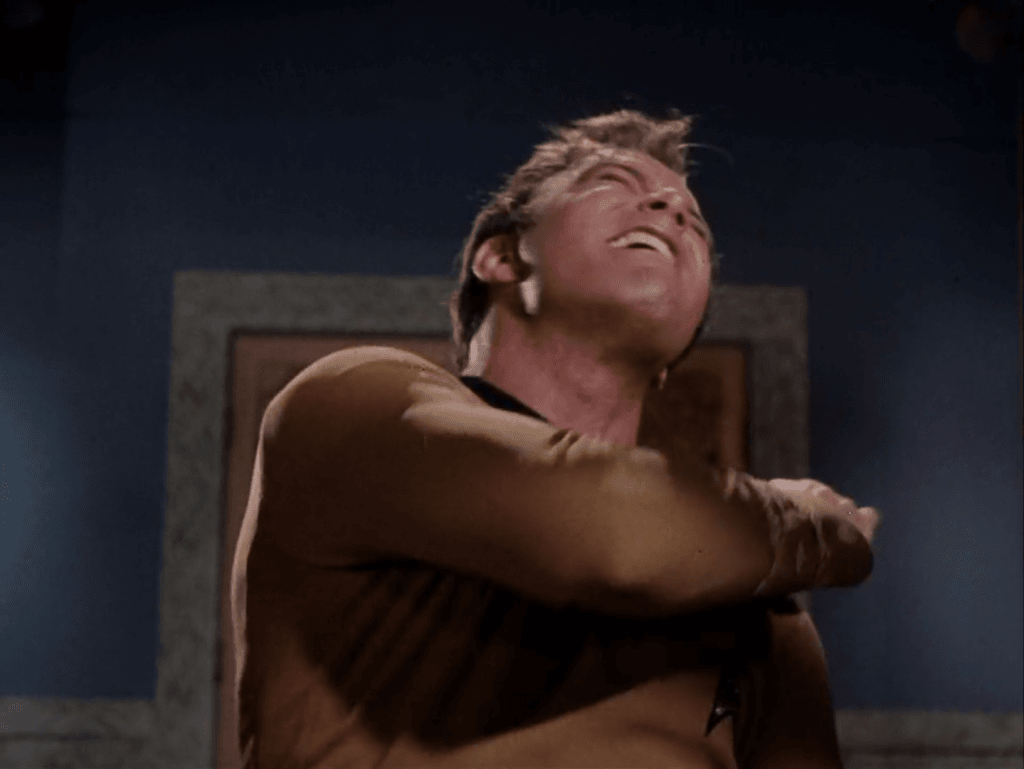
Hello and welcome to ‘Final Frontier Friday’! This week we’re turning our attention to the original series for a fiftieth (ish) anniversary look back at the landmark episode ‘Plato’s Stepchildren’. I’m actually a week early on this, the original airdate being 11/22/68. But next week is an off-week, and I wasn’t about to be late to the party with this one!
We all know why the episode is a landmark, right? It’s the one that’s famous for featuring the first interracial kiss on American television. Though in actuality the history isn’t quite that straightforward. So was it or was it not the first interracial kiss to be televised? Well, it sort of depends on how you define “interracial.” Yeah. This is going to be one of those history lessons. See, if you define it as broadly as possible (a kiss between a white person and a not-white person), then ‘Plato’s Stepchildren’ was beaten to the punch several times over, including by ‘Star Trek’ itself (though it aired later, ‘Elaan of Troyius’ – which saw more than a few liplocks between Kirk and Elaan (played by Vietnamese-descended actress France Nguyen) – was filmed first with nary a hint of controversy). There are several earlier examples of televised white/Asian kisses (some of which also involved France Nguyen) on episodes of ‘The Wild Wild West’, ‘I Spy’, and others. Going back a bit farther, ‘I Love Lucy’ featured its share of kisses between Lucille Ball (white) and Desi Arnaz (Hispanic), and while that gets into the thorny territory of race versus ethnicity and how, exactly, one defines whiteness, it’s a precedent nonetheless.

But let’s not kid ourselves. This was America in the late sixties, a country in the midst of some fairly substantial civil rights growing pains. No matter how academic you want to get about it, there’s no escaping the fact that in the context of the time, “interracial” could only mean “white and black”. Though “Plato’s Stepchildren” wasn’t quite the first across the finish line there either, as Sammy Davis Jr. and Nancy Sinatra greeted each other with a kiss during a musical variety special a year earlier. So with all of that nauseatingly nit-picky clarification out of the way, “Plato’s Stepchildren” features the first kiss between a fictional white man and a fictional black woman on American television.”
Now, I didn’t split all those hairs to diminish the episode’s legacy. On the contrary, I did it to establish context. This sort of thing wasn’t totally unheard of in the sixties, but it was rare enough that it would have garnered attention even under the best of circumstances. And “America in the late sixties” wasn’t always the best of circumstances where race relations are concerned. Think of it this way. ‘Plato’s Stepchildren’ aired about six months after the murder of Martin Luther King Jr. and the passage of the Fair Housing Act. The country – and the South in particular – could still fairly be described as a racial powder keg.

And it was that powder keg that nearly prevented the kiss from happening. As William Shatner and Nichelle Nichols have both recalled in memoirs, DVD extras, and countless interviews over the years, NBC was worried about the potential reaction in the South, both from viewers and from network affiliate, who could well have refused to air the episode. Several “solutions” were proposed, including having Uhura kiss Spock instead, as it would clearly be more acceptable for a black woman to kiss an alien than a white man (No one ever said racism was logical, folks!). Reportedly, it was Shatner who insisted on keeping the kiss as-is.
That being the case, a compromise was reached. They would film two versions of the scene: one with the kiss and one without. Of course, the ‘Star Trek’ people weren’t stupid. They knew full well that if the network had both versions of the scene, they’d almost certainly use the “safe” version. The actors thus took it upon themselves to force NBC’s hand. How? Why, by denying them a usable version of the kissless scene, of course! Shatner was particularly helpful in this regard, bringing the full force of his patented staccato line readings to bear and rendering more than a few kissless takes “absolutely awful,” in Nichols’ words. Finally, they gave the director a seemingly usable version, only to find while reviewing the dailies the next morning that in the last take – which, I stress, looked fine on set – actually ended with Shatner looking directly into the camera and wildly crossing his eyes. Facing a situation in which the only alternative was to cut the scene and butcher the episode, the network relented at last and history was made.
And in the end, was the concern warranted? Well, despite all of that drama, Nichelle Nichols would later recall that although the production office received more letters in response to this episode than any other, none of it was negative. As the story goes, the closest to a negative response may have been a letter that Roddenberry showed her from a Southern man – the exact demographic NBC was worried about upsetting – which read “I am totally opposed to the mixing of the races. However, any time a red-blooded American boy like Captain Kirk gets a beautiful dame in his arms that looks like Uhura, he ain’t gonna fight it.”
Hey! Segue!

The episode begins as the Enterprise responds to a distress call from an unknown planet, rich in kironide deposits. A landing party, consisting as usual, of Kirk, Spock, and McCoy, beams down to investigate. On arrival, they are greeted by Alexander, a dwarf in Ancient Greek garb, who identifies his people as the Platonians (so named for their admiration of the ancient philosopher) and leads them to their leader, Parmen. Parmen is suffering a massive infection as a result of having “scratched” his leg. As McCoy fiddles with his medkit and Parmen demonstrates surprising mental powers, Alexander (now clearly a servant) quietly pleads with Parmen’s wife Philana that the Enterprise crew “deserves better” before she telekinetically forced him to bite his hand.
As McCoy works to treat Parmen, Philana explains some of their history. When their sun went nova, they settled on Earth during the time of Plato, leaving when the Greek civilization fell. They eventually made their way here, where they built a utopia patterned on Ancient Greece. The lack of physicians is born of a lack of need, as Philana describes the Platonians – themselves the product of selective breeding – as perfectly suited to their utopia. Along the way, they developed their mental powers and apparently stopped aging – Spock estimates Philana‘s age as thirty-five, only to learn that he’s off by two thousand years. Unfortunately, these idle centuries have seen the decimation of their immune systems, hence Parmen’s seemingly minor wound leaving him at death’s door.
In a fit of delirium, Parmen lashes out telekinetically, his outburst hurling statues and furniture about the room and even affecting the Enterprise in orbit. Parmen’s increasingly violent lashing out is ended when McCoy manages to sedate him, and the doctor decides it would be best to stay until the fever breaks. Philana has Alexander lead the party to a lodging, and once there Kirk asks Alexander if there are others like him – meaning Platonians who lack psychokinetic abilities. He plies that he is the only one, hence his status as slave and court buffoon. As Alexander leaves, McCoy joins them, gladly informing Kirk that Parmen is on the mend. Relieved, Kirk calls for beam up, only to learn that the controls are frozen. The Enterprise cannot beam them up, break orbit, or even contact Starfleet. Kirk goes to confront Parmen, who doesn’t take kindly to his demands that the Enterprise be released. The self-styled philosopher king psychokinetically relieves Kirk of his phaser and forces the captain to slap himself repeatedly.
